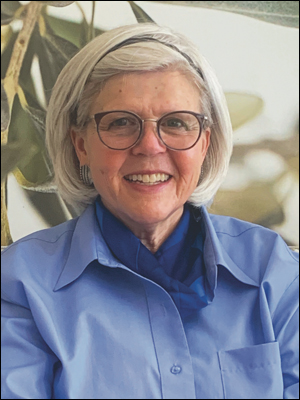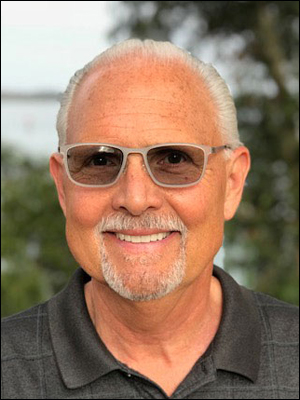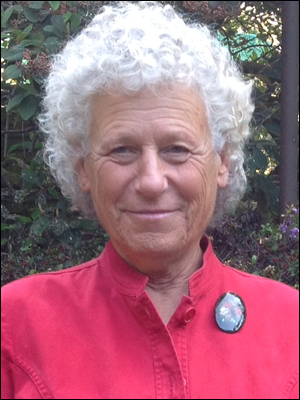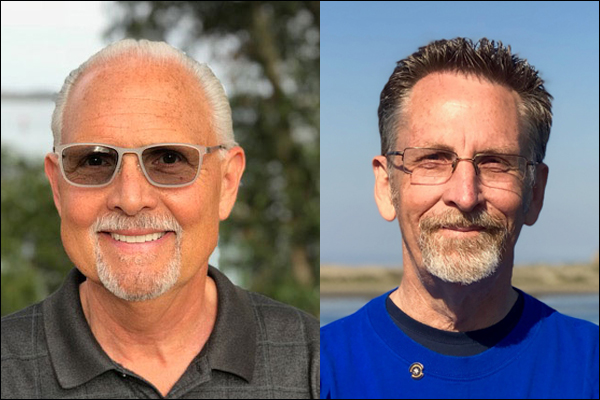Incumbent Dr. John Headding and challenger John Weiss are running for the mayor’s seat in Morro Bay,.
Two men are vying for Morro Bay Mayor’s job in a rematch from the last election, and four people are vying for two council seats, with just one incumbent in the running.
Local business owner, John Weiss, is challenging Mayor Dr. John Headding, a retired pharmacist, in a rematch from the 2018 election, which Headding won in a close race.
On the Council side, incumbent Robert Davis is seeking re-election and the other available seat is wide open, as Councilwoman Marlys McPherson decided not to run again.
Former Councilwoman, Betty Winholtz, former planning commissioner Richard Sadowski, and retired public administrator, Laurel Barton, are Davis’ challengers.
The Estero Bay News this year asked residents of Morro Bay what issues they wanted the candidates to address, through a posting on Morro Bay Nextdoor, a local social media gossip site and had nearly 50 responses.
The four questions here address the issues most often mentioned in that informal poll.
Candidate answers are in alphabetical order.
Laurel Barton

Laurel Barton, 67, has two adult sons ages 28 and 30. She holds a bachelor’s degree in plant science from Fresno State University, and a master’s degree in public administration from the University of San Francisco. She worked over 30 years in an administrative capacity for cities and school districts. She’s been vacationing in Morro Bay for over 15 years, bought a home here 6-years ago, and has been permanently living in Morro Bay for the past 2 years.
Among her stated hobbies is public gardening with Morro Bay in Bloom, walking through the city, and “Following great ideas from great cities across the country.”
Question-1: Many residents are concerned about the pilot program of RV camping on the waterfront. What is your position on this and should it become a permanent feature of the waterfront and a revenue source for the Harbor Department?
L.B.: The Harbor Department needs a sustainable, stable source of revenue. Whether the dry camping experiment is sustainable depends on the answers to the following questions:
1. With the State camping facilities reopened, is there enough demand for these sites to justify their burden?
2. Are there sufficient amenities available to ensure that health and safety issues are adequately addressed?
3. What has the experience been during the trial period? How much intervention by Harbor and law enforcement personnel was required?
4. Does the revenue generated justify the financial and other costs — for example the loss of space for other use?
5. What is the experience of allowing tent camping at the site adjacent to the Maritime Museum?
6. If the experiment is extended, are additional restrictions needed for sufficient safety and sanitation for campers, city facilities and residents?
7. If extended, should this be seasonal or year-round use?
Q-2: Residents are concerned about the Water Reclamation Facility project, and want to know what candidates will do to either lower their water/sewer rates or avoid rate increases in the future?
L.B.: The best way to protect against rate increases is delivering the WRF within the deadlines imposed by the Water Board. Delays in projects always result in higher costs.
The current rate structure was approved by Morro Bay voters and is tied to this project and this timeline. If we were to pause the project now, or consider a different site at this late date, we are in danger of losing the conditions that made us eligible for the low interest loan that is critical to keeping the rates down. And, if we were to abandon this project in favor of some other option, as some advocate, we will still have to pay back at least $24 million in loans with zero progress toward a fully functioning plant, and the risk of RWQCB fines.
There are many opportunities for economies to avoid rate increases once the plant is functioning. We can investigate lower cost, alternative energy sources (wind, solar) to decrease the cost of running the plant. We can incentivize retrofitting for low flow water options and water-efficient landscaping techniques for homeowners to lower their water bills.
Q-3: What is your position on vacation rentals operating in residential neighborhoods; what should be the maximum number of licenses; and how would you enforce against unlicensed VRs?
L.B.: The vacation rental ordinance is expected to pass before the new council is seated, however, the new ordinance is just the beginning. The city will need to carefully monitor the effectiveness of the ordinance to make sure it meets the goal of balancing the peaceful enjoyment of neighborhoods with the rights of property owners and the generation of revenue through bed tax.
We will not know if the maximum number of permits is appropriate, if buffer zones are sufficient, or if increased enforcement contemplated reduces the issues articulated by neighbors until the ordinance is in place for at least one tourist season. However, eliminating unpermitted vacation rentals is key to success.
Q-4: Many residents are concerned about the city’s finances and asked what your ideas are to increase tax revenues; and how can we diversify the local economy, i.e. what industries do you feel would be a good fit for our small community?
L.B.: Essential city services cannot be maintained without a significant, sustainable source of revenue. The city has decreased its labor costs over the past several years, with deeper cuts in response to the revenue drop and expense increase brought by COVID-19. I therefore support the 1% sales tax increase as the least painful way of bridging the revenue/expense gap and restoring our reserves.
I’d work to identify businesses that are based here and want to remain, but are facing challenges. It’s a better use of resources to support existing businesses and help them thrive than to constantly seek something new.
We have several underutilized spaces in each of our business districts that, with creative reuse, could meet the needs of a growing business.
Sectors to be encouraged would include health care, especially in elder care or memory care to match our current population demographics; outdoor sports companies who seek small to medium sized manufacturing facilities could be approached. Marine-based research facilities needing a location close to the bay and ocean would be worth exploring and green economy jobs, like working with wind energy, are also something I would support.
Robert Davis

Incumbent Councilman, Robert “Red” Davis, and his wife, Gail, bought a home in Morro Bay in 1991 and have lived here full time for more than 20 years. He has served as secretary and treasurer of the Morro Bay Chamber of Commerce, president of Morro Bay Friends of the Library, a member of the Integrated Waste Management Authority, member of San Luis Obispo Council of Governments, and various City Council sub-committees, such as Cannabis Ordinance, Wind Farm Development, Chevron property negotiations, Revenue Enhancement measures, Tidelands Lease Policy, Community Choice Energy, Recreation and Parks Commission and the City’s Tourism Board.
Davis holds a bachelor’s degree in human resources management and public employee labor relations. He worked 33 years at Caltrans as a budget analyst, training manager, contract compliance officer and planner. During that same time he was also a Senior NCO in the Air Force Reserve, serving as training officer, deployments officer and supervising an air terminal operations center.
His priorities for the future are:
• Complete the WRF so that we become water-independent and drought-proof;
• Continue to work with the chamber to develop a more diverse local economy;
• Develop open space and recreational opportunities for the Chevron property, power plant and existing water treatment plant;
• Create additional affordable housing opportunities;
• Supports our fishermen and develops offshore wind energy;
• Improve harbor and waterfront areas with a plan to match resources with needs;
• Develop new revenue so that we can: maintain local control of police and fire resources; repave our streets to acceptable standards; and, maintain clean public restrooms and weekend trash pickup.
Q-1: RV campsites on the waterfront:
RD: Council agreed to conduct this as an experiment, with a temporary permit from the Coastal Commission, to see how it works. Harbor Department needs new revenue to repair, maintain and upgrade facilities and this might be a feasible part of the solution. We are closely monitoring to gauge pros and cons and we will revisit the program in December.
Q-2: Water/sewer rates:
R.D.: Right now we’re good, even with contract change orders dealing with the red legged frog and the delay in permitting the erosion feature. Our two low interest loans and our contingency fund are giving us room for these added expenses. Council will review expenses as soon as we solidify the State Revolving Fund loan terms and see if we can reduce rates at that time.
Q-3: Vacation rental ordinance:
R.D.: Council took the recommendations that came to us from the STR Committee, Planning Commission and TBID and set the number at 175 as presented by those three advisory bodies. We will set the annual permit fee at a level that will pay for a full-time compliance officer to monitor all STRs and look for those operating illegally. That includes our reviewing consultant, Host Compliance, which reviews all advertising media throughout the state looking for ads for unpermitted rentals in Morro Bay.
Q-4: The Economy:
R.D.: Mayor Headding and I are actively engaged with Castle Wind to bring clean offshore wind energy to Morro Bay and provide jobs for residents, especially for our fishermen who will provide support for offshore service and maintenance. We are working in partnership with the Chamber of Commerce to offer opportunity sites for development and to improve and streamline our permitting process to facilitate development. I am personally connected to REACH to help us create additional housing that will bring more young working families and service employees to live in Morro Bay. Affordable workforce housing is essential to attracting new industry and I am committed to making that happen.
Dr. John Headding

Incumbent Mayor Dr. John Headding, 67, is married to wife, Sue, an RN, and they have two adult daughters, one of whom lives in Morro Bay with her husband and two children who attend school in Morro Bay. Dr. Headding holds a bachelors of science degree in pharmacy and a doctor of pharmacy degree (both from University of the Pacific Stockton, Calif.); and a masters degree in healthcare administration from the University of Colorado. The Headdings have lived in Morro Bay since 2012.
His top priorities are:
1) Achieve economic and financial sustainability;
2) Maintain core public safety services (police/fire/maintenance);
3) Complete the WRF project and capital projects for fixing existing, old sewer/water infrastructure;
4) Improve communication and community engagement in important city decision making;
5) Complete the general plan/local coastal plan update;
6) Assist local businesses to improve sustainability through COVID-19;
7) Work with the Bureau of Ocean Energy Management to bring wind energy to Morro Bay;
8) Continue to work with Vistra Energy to re-develop the existing abandoned power plant; and,
9) Implement the housing element plan to bring more affordable housing units to Morro Bay.
Q-1: RV campsites on the waterfront:
J.H.: I do support this as it is only a pilot program, and will be reevaluated by the council to determine long-term feasibility. This involves approximately 20 spaces that will not significantly impact parking or viewshed. With the 20 spaces in the pilot program being occupied at 50% occupancy this will generate approximately $175,000 per year in additional revenue for the harbor department, which is desperately needed for capital improvements in the future.
Q-2: Water/sewer rates:
J.H.: The current WRF project including the reclamation component has received unprecedentedly low interest rate financing. With our EPA loan financing approximately 50% of the project, and SRF Loan/grant (which should be received within the next 3 months) financing approximately 50% of the project, we will save over $40 million in debt costs. Recent analysis shows that the current rates are more than adequate to cover project costs and debt costs. The council recently increased rebates to our most vulnerable financially challenged individuals and will reevaluate the rate structure again after receipt of the SRF financing. I anticipate because of historically low interest loans, that water and sewer collection rates can be decreased In the future.
Q-3: Vacation rental ordinance:
J.H.: The current City Council at the last meeting recommended adoption of the new vacation rental ordinance for the city. The new ordinance will decrease the number of non-hosted short-term vacation rentals from 250 to 175 permits in residential neighborhoods. New density buffers are part of the ordinance, which will eventually decrease the impact of non-hosted short term vacation rentals in residential neighborhoods. Additionally the council recommended increasing the permit fee, and recommended a strict system for fines that will generate revenue in order to fund proper code enforcement of the ordinance. We have also retained the services of a company that specializes in identifying unlicensed vacation rentals in our community. The New ordinance suggests strict penalties for operation of illegal short-term vacation rentals.
Q-4: The Economy:
J.H.: The city continues to maintain a balanced budget, but COVID-19 impacts have resulted in significantly reduced revenues. I support measure E-20, which is the 1-cent sales tax increase proposed for the city. This will generate approximately $2 million per year helping us to maintain core public safety services such as police and fire. Tourists pay for approximately 70% of sales tax dollars and I believe they should pay their fair share for city services utilized.
Additionally, I support continuing to pursue development of the opportunity sites identified by the city council — Market Place Plaza on the Embarcadero; Bank of America site, etc. Also redevelopment of the Vistra (formerly Dynegy) site and pursuit of wind energy development offshore could result in significant new revenues for the city. Lastly, we must achieve the goals of our housing element in order to produce more affordable workforce housing to accommodate new industry.
Richard Sadowski

Richard E.T. Sadowski, 62, married, has a bachelor of science in mechanical engineering, and is a Certified Wastewater Collection and Conveyance professional. “I moved to San Luis Obispo County in 1981 and to Morro Bay in 2003,” he said.
His top priorities are:
1) Rein in the runaway WRF consultant costs and lower water rates;
2) Clean up the City finances and restore our emergency fund; and,
3) Collaborate with the Cayucos Sanitary District on repairing the jointly owned 60/40 Main Street sewer main that is currently ex-filtrating raw sewage into our Morro Creek basin drinking wells.
Q-1: On RV camping on the waterfront:
R.S.: The RV camping pilot at selected locations was initiated while the California State Parks were still closed due to the COVID-19 pandemic. This dry camping idea was piggybacked on an ‘Emergency Permit’ issued for outside dining during the pandemic. The dry camping pilot was irresponsible and showed that our City Council is not concerned about putting our resident’s health and safety first. Out of town campers were boasting how much they saved by not having to pay for lodging for all their friends and family and simply pay the $250 fine.
Q-2: On lowering water/sewer rates:
R.S.: This City Council is in over their heads regarding the WRF and the consultant costs. I have the education and experience to be able to hold the WRF consultants accountable and to rein in the runaway costs for this project. As a council member, I would work on lowering the water rates and properly prioritize the different aspects of this project.
Q-3: On the vacation rental ordinance:
R.S: The City needs active enforcement on vacation rentals (VR) that need to be funded by VR permit fees. VRs are businesses operating in neighborhood residential zones and should be limited. If elected, I would entertain limiting the number of VR’s to around 150. That said, if elected, I would meet with hotel owners, neighboring residents, and realtors and flush out the details.
Q-4: On the Economy:
R.S.: We are a tourist town. Our economic engine is an organic one; people come to visit here because of the living beauty surrounding us. I am currently collaborating on a project with Cal Poly academia studying the effects of ocean acidification. I would continue to reach out to academic institutions and State agencies to invest in protecting our biodiversity and help our local citizens scientists with job creation.
John Weiss

John Weiss and wife, Christine, have five children and three grandchildren. Three graduated from Morro Bay High School, and two from U.C. Berkeley (one Phi Beta Kappa and Magna Cum Laude).
Weiss has lived in and owned a small business, Coast Electronics-RadioShack, for over 40 years in Morro Bay, which he co-founded with his father (Dick Weiss) in 1978. He served as Chamber of Commerce President from 2006 to 2008 and 2011; and joined the Rotary Club of Morro Bay in 2001.
He served as club president in 2009-2010 and was Rotary District Governor over Kern, San Luis Obispo, Santa Barbara, and Ventura Counties.
He credits both experiences — with the Chamber and Rotary — teaching him leadership skills, as well as running his family business with “my great staff.”
Weiss helped form an Environmental Rotary Club in 2011 and a Rotary club at the high school — Rotary for Young Professionals. His passion is community service including trash pick up starting in 2010 at the Roundabout, Bay Shore Bluffs, Morro Rock and the Embarcadero.
At his store, he said that many of his employees have worked for him over 20-35 years.
He graduated from the MBPD Citizens Academy in 2012 and said he “found it beneficial to better understand Public Safety. My family, business, and community service are very important to me. If elected Mayor, I promise to bring my 42-years of local experience to help our city and community, which I love, to thrive and protect our Public Safety services.”
Q-1: RV campsites on the waterfront:
J.W.: State parks have now reopened across California, so there’s no reason to allow RVs on the waterfront. Dry camping is also a significant public health risk. In light of these facts, I would disband this program, particularly as it competes with the operator, which provides full RV camping services and is located on City property.
Rather than raise needed revenue for the Harbor with the dry RV Camping on the Waterfront, I would work with the stakeholders to increase revenues in an equitable manner to help make the Harbor financially sustainable without sacrificing our environment and competing with our own full service tenant that is not on the Embarcadero. Violators should receive penalties that are true incentives not to break our laws.
Q-2: Water/sewer rates:
J.W.: Water and sewer rates have been on the rise since 2007, with little to show for it except for delays and mounting costs. In office, I will reactivate the WRF Citizens Advisory Committee to evaluate how to reduce costs for the project and make the right decision for ratepayers.
Q-3: Vacation rental ordinance:
J.W.: The current Vacation Rental Ordinance does not protect some neighborhoods and the occupancy rate of hoteliers by unlicensed operators.
I continue to support unlimited hosted vacation rentals. The current council campaigned on making changes shortly after being elected to protect the stakeholders and neighborhoods. Only now is something coming forward. Having listened to the drafts prepared by the Planning Commission and TBID, they are only now considering their proposals with a few changes at a future council meeting for adoption.
I support active enforcement and fair treatment of the licensed operators and consideration of the hotelier stakeholders and as noted above unlimited licensed hosted vacation rentals.
Q-4: The Economy:
J.W.: Economic recovery is going to be my number one priority if elected as Mayor. We need to support our business community by simplifying the permitting process and reducing the costs of operating a business. I am against the Recovery/Emergency Sales Tax increase, which has no sunset clause; and the 1% sales tax is higher than currently needed, especially when the pandemic ends.
Rather, if this tax measure is not passed by the citizens, and future revenues or cuts are insufficient, I would recommend a “Measure Q-2” special election, with that money being especially for fire, police and roads at 0.5% for a period to coincide with the pandemic.
I helped to pass the current Measure Q back in 2006 and I can help again. If needed, Measure Q-2 would bridge the gap and be used only as long as we are in a Pandemic. I would work to attract and retain new industries, especially partnering with Cal Poly and the National Estuary to help protect the Bay.
I would work with local successful businesses to expand and also help to find affordable housing for our workers. Finally, I would reinstitute the Community Forum I helped start in 2006 with businesses and local citizens to collaborate and identify needed changes to make our City an even better place to live and work.
Betty Winholtz

Former 2-term Councilwoman, Betty Winholtz is running once again to take a leadership role representing residents of Morro Bay. She came to Morro Bay in 1986 from Iowa and holds a master’s degree in counselor education.
Early on, she worked for former councilman the late-John Baker’s ice cream shop in Downtown Morro Bay where she had deep discussions with Baker about hard work and service, and his foundation for a successful storefront and way of life.
She created a full-time career as a private academic tutor. As a self-employed businesswoman, she learned the additional value of fiscal conservatism.
Winholtz was a member of the White Caps and German Bands, Morro Bay Beautiful, M.B. Historical Society, M.B. Seniors, Save the Park (a non-profit that fought to conserve Cerrito Peak), and a volunteer with MBHS and El Chorro Regional Dog Park.
She said that, a fiscal conservative and prior City council member, she knows we can do better with City finances. “A budget should balance without using emergency reserve funds,” Winholtz said. “First Responders and
other City services can be locally maintained through concrete [not temporary] changes and strict spending rules and not expensive consultants.”
Q-1: RV campsites on the waterfront:
B.W.: This is neither a sound nor healthy way to boost the Harbor Fund’s revenues. The City should not be in competition with private businesses, which is what this creates. Allowing camping on the Embarcadero has been proposed before, but this is the first City Council to approve it.
Q-2: Water/sewer rates:
B.W.: It is naive to state increased rates can be avoided when the Maximum Guaranteed Price has already been raised once with another increase in the wings along with more change orders; when the lowest bid for four pipelines down Main and Quintana is $7 million over estimates to say nothing of the business and sales tax loss to Quintana storefronts; when the cost for unpaid easements as a result of imminent domain is in the hundreds of thousands of dollars; and when ongoing operating costs for pumping sewage 3 miles uphill isn’t disclosed.
These costs stop if we stay at the current site and upgrade what we have. Then the ratepayer will see a refund — do the math.
Q-3: Vacation rental ordinance:
B.W.: Hosted VRs can be unlimited because there is a live-in enforcer, the home owner; un-hosted VRs should be limited in quantity (1% of the population which is approximately 100) for residential and mixed use zones. There are many residents in mixed use zones and they have not been immune from converting long term rentals into short term rentals. Enforcement is key, and an anonymous hotline should be provided where suspected illegal units can be reported.
Q-4: The Economy:
B.W.: Curbing spending is as important as revenue enhancing to balance the budget: make permanent the temporary 5%-8% salary freezes until the end of COVID-19; institute zero-base budgeting in the next budget cycle; move City Hall and public service offices to the second floor of the Community Center, freeing up the City’s half block of Harbor/Shasta/Dunes to sell or for housing.
The kinds of businesses that seem to survive in Morro Bay are home-grown businesses, which depend on permanent residents as much as tourists for their trade.




